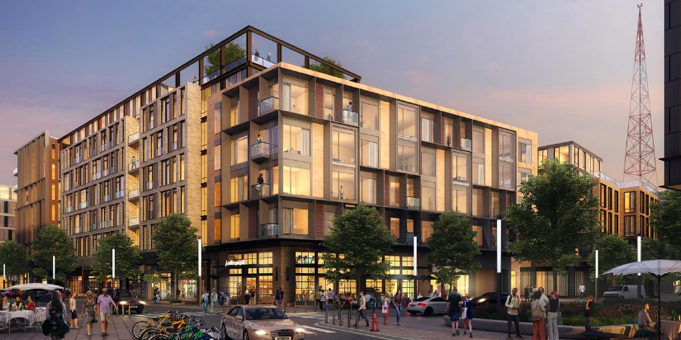If built today, Northland would be the biggest Passive House development in Massachusetts.
Passive House is the most efficient building standard in the world. It is increasingly being encouraged, especially for new construction buildings.
It’s the best path to ‘net zero,’where buildings produce all the energy they use through renewable sources. Passive House construction reduces a building’s overall energy use by 40%+ compared to most new buildings and to most new LEED-certified buildings.
280 units or 35% of the residential apartments in the proposed Northland Newton project would be built to the extremely high Passive House energy standard, ensuring these new buildings will contribute much less to climate change per occupant than existing Newton single homes. Newton would be a model in sustainable building for Massachusetts and beyond.
In two other important ways, Northland Newton would be on the leading edge of green building practices:
- There will be no gas for heating and cooling, and instead the buildings will use efficient electric heat pump technology.
- The developer is working to reduce the climate impact of the building materials being used.
Passive House certified buildings use quantitative metrics to ensure five building-science principles:
- The buildings are extremely airtight and less drafty (4-5 times less drafts and air infiltration than would normally be required of new construction in Newton)
- Passive House buildings bring in much more ventilation and fresh air than new construction conventional buildings. They also use balanced heat and moisture-recovery ventilation. These features assure much healthier indoor air quality than conventional new construction
- Passive House buildings have high-performance doors and triple pane windows. The windows are oriented and designed to exploit the sun’s energy for heating purposes in the heating season and use shading to minimize excessive heat during summer.
- Continuous insulation is used throughout Passive House building exteriors to avoid loss of heat through walls.
- The buildings are so energy efficient that much smaller heating and cooling systems are needed than in conventional new construction.
To meet Massachusetts’ climate goals, we need to ensure that all new construction is extremely efficient. Passive House is our best way to do that. MassSave now has incentives to help owners build and to become certified to this standard.
More information is available at the Passive House MA website and What is Passive Building? byPassive House Institute U.S.
Beverly Craig, LEED AP BD+C is on the Newton Energy Commission and is a Green Newton board member.



Recently on Twitter